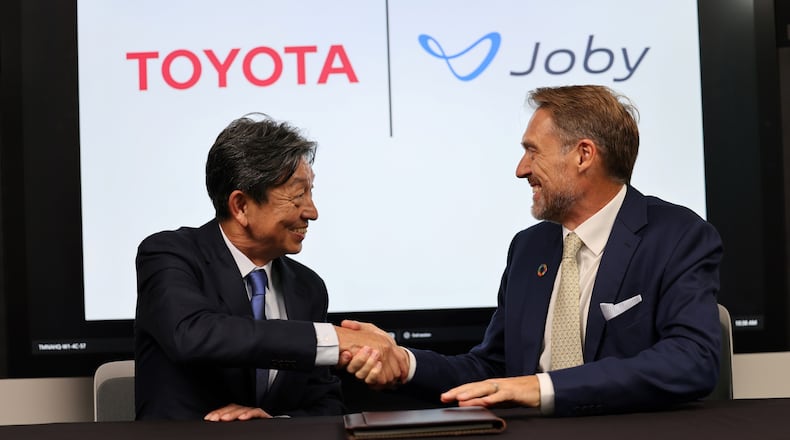Then last week, Joby said it was launching a new underwritten public stock offering to sell up to $200 million of shares of common stock. The company issued 40 million shares at $5.05 per share.
“Joby currently intends to use the net proceeds that it will receive from the offering, together with existing cash, cash equivalents and short-term investments, to fund its certification and manufacturing efforts, prepare for commercial operations and for general working capital and other general corporate purposes,” the company said on announcing its stock offering last week.
The offering was expected to close Monday, subject to customary closing conditions. On that day, Joby’s shares closed at $5.27.
All that cash positions Joby to continue building “flying taxi” prototypes and seeking Federal Aviation Administration certification of its aircraft.
The company faces challenges. In August, Joby reported a net loss of $123 million for the second quarter of 2024, but company principals also said at the time that the business maintained a strong cash position, with $825 million in cash and short-term investments, even before Toyota’s new investment.
But at the time of the August quarterly earnings release, that cash position was down from March, when Joby had more than $900 million.
Joby is scheduled to release third quarter results Nov. 6.
A message seeking comment was sent to a Joby representative Wednesday. A spokesperson for the company responded, saying: “We are pleased to have been able to maintain the strongest balance sheet in our industry. Following Toyota’s announcement that they intend to invest a further $500 million in Joby and the publication of the SFAR (special federal aviation regulation) by the FAA, we took the opportunity to build on our liquidity position, diversify our funding sources and further strengthen our balance sheet with an additional (equity) raise.”
Joby’s shares closed at $5.01 Tuesday, down 4.9%. They closed Wednesday down a further two cents, $4.99.
‘The next thing that is transformational’
Elizabeth Williams, a faculty lecturer in finance at UD and a former investment banker, agreed that a follow-on or secondary stock offering is a common way for companies to raise cash.
“They just need more money,” Williams said. “Lots of start-up businesses do.”
She noted that shares of Joby have a “beta” value of 1.97, a measurement of the share’s volatility relative to the overall stock market. But Williams said she expects shareholders of Joby — a company trying to create a new market for air travelers — to be accustomed to a fair amount of volatility.
“That’s about as volatile as it gets,” she said of a value of 1.97.
However, Williams said she doubts Joby shareholders are alarmed by the stock’s recent gyrations in value. The stock has a 52-week range of $4.50 to $7.69.
“There are investors out there who are happy to play the long game with a highly risky investment,” she said. “It could be the next Nvidia, the next Amazon, the next thing that is transformational.”
Production of components for Joby electric vertical takeoff and landing vehicles (eVTOL) will begin in Dayton early next year, Greg Bowles, Joby’s head of government relations and regulatory affairs, told the Dayton Daily News in August.
Joby leaders have touted their aircraft as faster and quieter than cars, with Joby founder and Chief Executive JoeBen Bevirt saying Joby’s aircraft can “move more people more miles per hour.”
Dan Kapusta, a UD professor of finance and the director of UD’s Davis Center for Portfolio Management, said there are two ways for a company to raise capital or money. One is taking on debt. And the second is equity — selling co-ownership of a business with individuals and institutions.
He pointed to the famous example of restaurant Chipotle, which was founded in the early 1990s. By 2006, the chain had only 200 or so stores. It turned to an initial public offering, selling some 8 million shares of stock.
Chipotle raised $160 million. Its shares were initially sold at about $22. Today, it trades at well over $55. And it has more than 2,000 stores, Kapusta said.
When a company is already public, like Joby, it can extend a secondary stock offering, again in an effort to raise capital to grow its business, he said.
Initial growth companies, or relatively new companies, can burn through cash quickly, Kapusta said. And for “pre-revenue” companies working in new markets, or trying to create new markets, cash is important, he agreed.
About the Author

